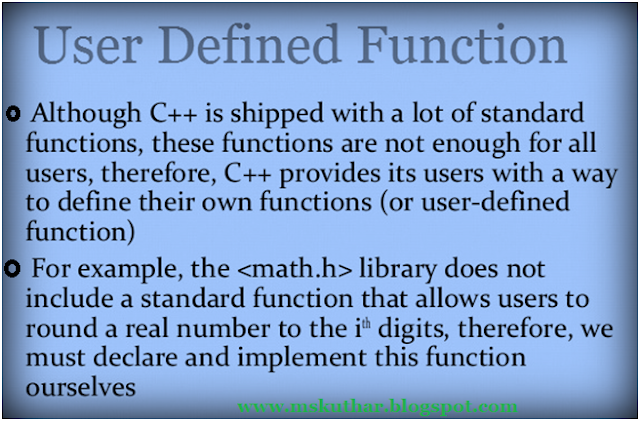Function
- A feature is a data-acting sub-program that often returns a value. A software written with multiple functions is simpler than a very long program to manage, upgrade and debug.
- Most programmers will work independently on separate functions by programming in a modular (functional) manner, which can be installed at a later date to construct the entire project.
- Every single feature has its own name. When that name is encountered in a program, program execution branches to the function's core.
- After completion of the operation, execution returns to the system code area from which it was named, and the program proceeds to the next line of code.
 |
| User Defined Function in C++. |
Creating User-Defined Functions
Declare the function.
- The statement, called the FUNCTION PROTOTYPE, tells the programmer of the functions to be used in a program, the argument they are taking and the type of value they are returning.
Define the function.
- The description of function tells the compiler which role the function must perform.
- The prototype function and function description on return form, name and parameters must be the same.
- The only distinction between prototype function and header function is a semicolon.
- Type description consists of header type and body function.
- The header is EXACTLY like the prototype function, EXCEPT it contains NO terminating semicolon.
//Prototyping, defining and calling a function
#include <iostream.h>
void starline(); // prototype the function
int main()
{
starline( ); // function call
cout<< "\t\tBjarne Stroustrup\n";
starline( ); // function call
return 0;
}
// function definitionvoid starline()
{
int count; // declaring a LOCAL variable
for(count = 1; count <=65; count++)
cout<< "*";
cout<<endl;
}
Argument To A Function
- The calling method also provides other values for the function called. These are referred to as criteria.
- The variables which supply a calling function with the values called actual parameters.
- Formal parameters are called the variable that receives the value from the argument.
Consider the following example that evaluates the area of a circle.
#include<iostream.h>
void area(float);
int main()
{
float radius;
cin>>radius;
area(radius);
return 0;
}
void area(float r)
{
cout<< “the area of the circle is”<<3.14*r*r<<”\n”;
}
- Here radius is called actual parameter and r is called formal parameter.
Return Type Of A Function
// Example program
#include <iostream.h>
int timesTwo(int num); // function prototype
int main()
{
int number, response;
cout<<"Please enter a number:";
cin>>number;
response = timesTwo(number); //function call
cout<< "The answer is "<<response;
return 0;
}
//timesTwo function
int timesTwo (int num)
{
int answer; //local variable
answer = 2 * num;
return (answer);
}
